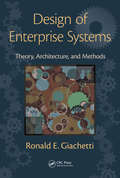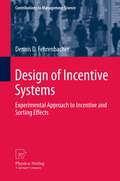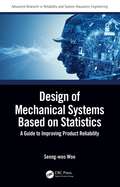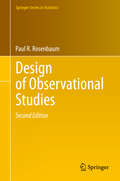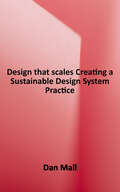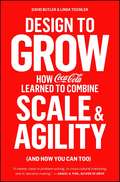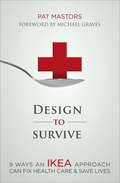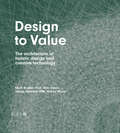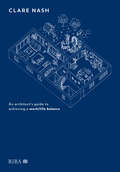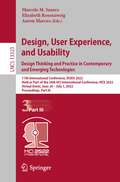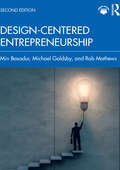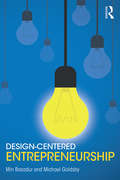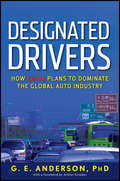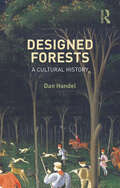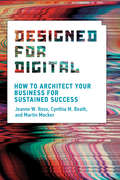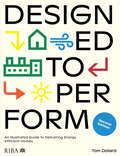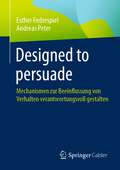- Table View
- List View
Design of Enterprise Systems: Theory, Architecture, and Methods
by Ronald GiachettiIn practice, many different people with backgrounds in many different disciplines contribute to the design of an enterprise. Anyone who makes decisions to change the current enterprise to achieve some preferred structure is considered a designer. What is problematic is how to use the knowledge of separate aspects of the enterprise to achieve a globally optimized enterprise. The synthesis of knowledge from many disciplines to design an enterprise defines the field of enterprise engineering.Because enterprise systems are exceedingly complex, encompassing many independent domains of study, students must first be taught how to think about enterprise systems. Specifically written for advanced and intermediate courses and modules, Design of Enterprise Systems: Theory, Architecture, and Methods takes a system-theoretical perspective of the enterprise. It describes a systematic approach, called the enterprise design method, to design the enterprise. The design method demonstrates the principles, models, methods, and tools needed to design enterprise systems. The author uses the enterprise system design methodology to organize the chapters to mimic the completion of an actual project. Thus, the book details the enterprise engineering process from initial conceptualization of an enterprise to its final design.Pedagogical tools available include:For instructors: PowerPoint® slides for each chapter Project case studies that can be assigned as long-term projects to accompany the text Quiz questions for each chapter Business Process Analyzer software available for download For students: Templates, checklists, forms, and models to support enterprise engineering activities The book fills a need for greater design content in engineering curricula by describing how to design enterprise systems. Inclusion of design is also critical for business students, since they must realize the import their decisions may have on the long-term design of the enterprises they work with. The book’s practical focus and project-based approach coupled with the pedagogical tools gives students the knowledge and skills they need to lead enterprise engineering projects.
Design of Heuristic Algorithms for Hard Optimization: With Python Codes for the Travelling Salesman Problem (Graduate Texts in Operations Research)
by Éric D. TaillardThis open access book demonstrates all the steps required to design heuristic algorithms for difficult optimization. The classic problem of the travelling salesman is used as a common thread to illustrate all the techniques discussed. This problem is ideal for introducing readers to the subject because it is very intuitive and its solutions can be graphically represented. The book features a wealth of illustrations that allow the concepts to be understood at a glance. The book approaches the main metaheuristics from a new angle, deconstructing them into a few key concepts presented in separate chapters: construction, improvement, decomposition, randomization and learning methods. Each metaheuristic can then be presented in simplified form as a combination of these concepts. This approach avoids giving the impression that metaheuristics is a non-formal discipline, a kind of cloud sculpture. Moreover, it provides concrete applications of the travelling salesman problem, which illustrate in just a few lines of code how to design a new heuristic and remove all ambiguities left by a general framework. Two chapters reviewing the basics of combinatorial optimization and complexity theory make the book self-contained. As such, even readers with a very limited background in the field will be able to follow all the content.
Design of Incentive Systems: Experimental Approach to Incentive and Sorting Effects
by Dennis D. FehrenbacherMonetary incentives, as a driving force for human behavior, are the main theme of this book. The primary goals underlying the application of monetary incentive systems in companies are motivating employees to strive for superior productivity in line with the interests of employers, and hiring adequately skilled employees. The first goal refers to incentive effects, the latter to sorting effects. This book introduces important theories and concepts concerning behavior under influence of monetary incentives; it reviews existing economic frameworks and identifies specific contingency variables. Based on an integrative framework of elements influencing incentive and sorting effects, a laboratory experiment is presented including detailed methodological discussion on experimentation and data analysis as well as an extensive presentation of findings and discussion of implications.
Design of Mechanical Systems Based on Statistics: A Guide to Improving Product Reliability (Advanced Research in Reliability and System Assurance Engineering)
by Seong-woo WooThis book introduces and explains the parametric accelerated life testing (ALT) methodology as a new reliability methodology based on statistics, to help avoid recalls of products in the marketplace. The book includes problems and case studies to help with reader comprehension. It provides an introduction to reliability design of the mechanical system as an alternative to Taguchi’s experimental methodology and enables engineers to correct faulty designs and determine if the targeted product reliability is achieved. Additionally, it presents a robust design methodology of mechanical products to withstand a variety of loads. This book is intended for engineers of many fields, including industrial engineers, mechanical engineers, and systems engineers.
Design of Observational Studies (Springer Series in Statistics)
by Paul R. RosenbaumThis second edition of Design of Observational Studies is both an introduction to statistical inference in observational studies and a detailed discussion of the principles that guide the design of observational studies. An observational study is an empiric investigation of effects caused by treatments when randomized experimentation is unethical or infeasible. Observational studies are common in most fields that study the effects of treatments on people, including medicine, economics, epidemiology, education, psychology, political science and sociology. The quality and strength of evidence provided by an observational study is determined largely by its design. Design of Observational Studies is organized into five parts. Chapters 2, 3, and 5 of Part I cover concisely many of the ideas discussed in Rosenbaum’s Observational Studies (also published by Springer) but in a less technical fashion. Part II discusses the practical aspects of using propensity scores and other tools to create a matched comparison that balances many covariates, and includes an updated chapter on matching in R. In Part III, the concept of design sensitivity is used to appraise the relative ability of competing designs to distinguish treatment effects from biases due to unmeasured covariates. Part IV is new to this edition; it discusses evidence factors and the computerized construction of more than one comparison group. Part V discusses planning the analysis of an observational study, with particular reference to Sir Ronald Fisher’s striking advice for observational studies: "make your theories elaborate." This new edition features updated exploration of causal influence, with four new chapters, a new R package DOS2 designed as a companion for the book, and discussion of several of the latest matching packages for R. In particular, DOS2 allows readers to reproduce many analyses from Design of Observational Studies.
Design that Scales: Creating a Sustainable Design System Practice
by Dan MallAfter years of building the same interface elements, some designers and developers get wise and try to create reusable, common solutions to help everyone stop reinventing the wheel every time. Most fail. In Design That Scales, design systems expert Dan Mall draws on his extensive experience helping some of the world's most recognizable brands create design practices that are truly sustainable and successful. "Dan's book is a game–changer for our approach to design systems, leading to significant changes at my company, making it a must–read for streamlining anyone’s complex design systems!" —Nadine Sarraj, Product Designer, 365 Retail Markets Who Should Read This Book? People who are building and maintaining design systems, large or small. Designers, engineers, and product managers who are in search of a more efficient way to work. Leaders and executives who want to effect change but aren't sure how to do it. People who have designed web forms and tables, but don't know what’s next. Takeaways - A design system is crucial for any organization managing two or more digital products. Learn how to create, manage, and sustain a successful design system. - See how the ecosystem of a design system works in order to understand the context for success. - Figure out where the people involved in a design system fit and how they can best collaborate. - Learn the metrics for success within a design system and how to measure them. - Determine the best techniques for marketing your design system to stakeholders. - Learn what guidance and relationships are crucial for a design system to succeed. - See the end-of-chapter questions that highlight how to guide your design system to a profitable outcome.
Design to Grow
by David Butler Linda TischlerExpert advice from Coca-Cola's vice president of Innovation and Entrepreneurship: Learn how Coca-Cola uses design to grow its business by combining the advantages of scale with the agility to respond to fast-changing market conditions.In today's world, every company is at risk of having a "Kodak Moment"--watching its industry and the competitive advantages it has developed over years, even decades, vanish overnight. The reason? An inability to adapt quickly to new business realities. Established companies are at risk, but it's no easier being an agile startup, because most of those fail due to their inability to scale. Tomorrow's business winners--regardless of size or industry--will be the ones that know how to combine scale with agility. In Design to Grow, a Coca-Cola senior executive shares both the successes and failures of one of the world's largest companies as it learns to use design to be both agile and big. In this rare and unprecedented behind-the-scenes look, David Butler and senior Fast Company editor, Linda Tischler, use plain language and easy-to-understand case studies to show how this works at Coca-Cola--and how other companies can use the same approach to grow their business. This book is a must-read for managers inside large corporations as well as entrepreneurs just getting started.
Design to Survive: 9 Ways an IKEA Approach Can Fix Health Care & Save Lives
by Pat Mastors&“Offers a foundation for both providers and consumers to find the balance, and move to a world from provider-centered care to patient-centered care.&” —Stefan Gravenstein, MD, MPH, Professor of Medicine, Case Western Reserve University The US spends the most in the world on health care and research, yet our outcomes are among the worst in industrialized nations. Hundreds of thousands die every year from medical harm. Imagine a world where health care took a page from the IKEA furniture company—where expenses were streamlined, quality was predictable, customers participated, and everyone shared in the cost savings. Through colorful analogies, stories from families and top doctors, and the author&’s quest to find out what happened to her own father, Design to Survive serves up key strategies for patients, families and providers, with the conviction that we can do better. &“Had me hooked from the first page . . . chock-full of stories, vital information, checklists, links, and resources . . . a must own for both clinicians and patients.&” —Fred Lee, author of If Disney Ran Your Hospital &“A tremendous toolkit for getting safe care . . . Mastors&’ is a wonderfully pragmatic mind. There is a lot we physicians can learn from her.&” —Marty Makary, New York Times–bestselling author of The Price We Pay &“Brilliant . . . the ideas unfold superbly . . . this could be the book that changes things.&” —&“e-Patient Dave&” deBronkart, author of Let Patients Help &“I couldn&’t put this book down . . . sensible and practical advice never before shared.&” —Ilene Corina, The Cautious Patient Foundation
Design to Value: The architecture of holistic design and creative technology
by Martin Wood John Dyson Mark Bryden Jaimie JohnstonWhat opportunities does Design to Value afford the built environment? Design to Value is a commitment to process above all else. Well understood and applied in the manufacturing industries, its potential is only now starting to be realised in architecture, engineering and construction. It challenges designers to lead the way in creating more innovative and stakeholder-centric analyses, workflows, construction techniques and products. Through architectural thinking, value in the built environment can be maximised. Seeking to create deep and lasting impacts on industry, society and the planet, Design to Value rejects architecture’s current professional services model. The design and delivery stages of traditional procurement routes are not sustainable, and Design to Value outlines a new path for informed design processes. Bryden Wood, leading international expert in Modern Methods of Construction (MMC) and the Platform approach to Design for Manufacture and Assembly (P-DfMA), has spent the last fifteen years developing Design to Value as part of a new framework for the future of the design and construction industry. In this essential book, the practice challenges architects and the wider industry to think differently about how value is generated, enhanced and retained in the built realm, providing a method that will improve outcomes for architects, clients, industries and society. Architects must bend and break habitual processes to build better systems, better buildings and better futures. Features: Over 125 images, including photographs, sketches and diagrams Over 20 international case studies, including those from Canada, France, India, Italy, Japan, Saudi Arabia and USA Projects from leading practices, such as Atelier Bow-Wow, BIG, David Miller Architects, Kieran Timberlake and Lacaton & Vassal, as well as Bryden Wood.
Design your life: An architect’s guide to achieving a work/life balance
by Clare NashTen years ago, Clare Nash was struggling with a common problem: how to be an architect and still have a life. With no job, no savings and no clients in the midst of a recession, Clare set up her own practice with little more than a few postcards in local shop windows and a very simple website. Determined to better combine her life and family with professional work, she created an innovative practice that is flexible and forward-looking, based around remote working and the possibilities offered by improving technology. Bursting with tips, ideas and how-tos on all aspects of designing a working life that suits you and your business, this book explains in clear and accessible language how to avoid the common pitfalls of long hours and low pay. It explores how to juggle work with family commitments, how to set your own career path and design priorities, and how to instil a flexible working culture within a busy lifestyle. Encompasses the full range of life-work challenges: Money, fees and cashflow Playing to your personal strengths Outsourcing areas of weakness Building a happy and productive remote-working team Creating a compelling marketing strategy Juggling parenthood and work Studying and honing workplace skills Provides the inside view from innovative practices: alma-nac, Gbolade Design Studio, Harrison Stringfellow Architects, Invisible Studio Architects, Office S&M Architects, POoR Collective, Pride Road Architects and Transition by Design.
Design, Control, and Operation of Microgrids in Smart Grids (Power Systems)
by Mehdi Rahmani-AndebiliThis book offers a wide-ranging overview of advancements, techniques, and challenges related to the design, control, and operation of microgrids and their role in smart grid infrastructure. It brings together an authoritative group of specialists who approach the subject from a number of different viewpoints in the electric power industry, including electricity distribution companies, aggregators, power market retailers, and power generation companies. Design, Control, and Operation of Microgrids in Smart Grids is an authoritative resource for students, researchers, and professionals working with power and energy systems.
Design, User Experience, and Usability: 11th International Conference, DUXU 2022, Held as Part of the 24th HCI International Conference, HCII 2022, Virtual Event, June 26 – July 1, 2022, Proceedings, Part III (Lecture Notes in Computer Science #13323)
by Aaron Marcus Marcelo M. Soares Elizabeth RosenzweigThis book constitutes the refereed proceedings of the 11th International Conference on Design, User Experience, and Usability, DUXU 2022, held as part of the 23rd International Conference, HCI International 2022, which was held virtually in June/July 2022.The total of 1271 papers and 275 posters included in the HCII 2022 proceedings was carefully reviewed and selected from 5487 submissions. The DUXU 2022 proceedings comprise three volumes; they were organized in the following topical sections: Part I: Processes, Methods, and Tools for UX Design and Evaluation; User Requirements, Preferences, and UX Influential Factors; Usability, Acceptance, and User Experience Assessment. Part II: Emotion, Motivation, and Persuasion Design; Design for Well-being and Health.- Learning Experience Design; Globalization, Localization, and Culture Issues. Part III: Design Thinking and Philosophy; DUXU Case Studies; Design and User Experience in Emerging Technologies.
Design-Centered Entrepreneurship
by Rob Mathews Min Basadur Michael GoldsbyGrounded in extensive research and field testing, Design-Centered Entrepreneurship presents a concise problem-solving approach to developing a unique business concept. Step-by-step guidelines provide insight into exploring market problem spaces, uncovering overlooked opportunities, reframing customer problems, creating business solutions, and sustaining success and an entrepreneurial culture. Drawing on methodologies from the world of design, the book helps students of entrepreneurship fill in the missing piece that transforms opportunity recognition into a viable business concept. Plenty of useful diagrams help to organize key concepts, making them easily accessible to readers. This second edition has been updated to include social entrepreneurship, more international examples and enhanced support materials. The digital supplements include a virtual creative problem-solving profile, slides, and an instructor manual. Design-Centered Entrepreneurship is the ideal text for entrepreneurship and new venture creation courses with a focus on design thinking.
Design-Centered Entrepreneurship
by Min Basadur Michael GoldsbySupported by extensive research and field-testing, Design-Centered Entrepreneurship presents a concise, problem-solving approach to developing a unique business concept. Step-by-step guidelines provide insight into exploring market problem spaces, uncovering overlooked opportunities, reframing customer problems, and creating business solutions. Basadur and Goldsby present students with a creative and practical approach to problem finding, perception, organizational culture, and ethics in the entrepreneurial field. Plenty of useful diagrams help to organize key concepts, making them easily accessible to readers. Drawing on methodologies from the design field, the book will help students of entrepreneurship fill in the missing piece that transforms opportunity recognition into a viable business concept. Additional support for students and instructors, including a virtual Creative Problem Solving Profile, can be found at www.basadurprofile.com/.
Design-Driven Innovation: An Introduction
by Roberto VergantiUntil now, innovation studies have focused either on radical innovation pushed by technology or incremental innovation pulled by the market. However, neither of these approaches takes into account the fact that people do not buy products, they buy meanings. In this introduction, noted innovation expert Roberto Verganti suggests a third strategy: design-driven innovation, or the radical innovation of meanings. He introduces the concept of design-driven innovation and describes how game-changing companies like Nintendo, Whole Foods Market, and Apple have created new markets and spurred sustainable profits and company growth by generating products and services that radically innovate meanings for customers. This chapter was originally published as chapter 1 of "Design-Driven Innovation: Changing the Rules of Competition by Radically Innovating What Things Mean."
Designated Drivers
by G. E. AndersonAn in-depth look at the Chinese car industry that sheds new light on the delicate nature of China's planned economyChina's unprecedented growth over the last three decades, along with the recent financial crisis in the West, has raised questions about the superiority of state-led capitalism. In Designated Drivers: How China Plans to Dominate the Global Auto Industry, G.E. Anderson, a specialist in finance and Chinese political economics, uses the auto industry to examine how China's industrial planning works, and explores whether state involvement in the economy really is a winning formula for sustainable growth.Bringing to light the strengths and weaknesses that define the Chinese economy, Anderson finds that in some ways the government has become its own worst enemy, unable to choose between industrial competitiveness and social stability. While the economy is booming now, evidence suggests that long-term success is far from assured. Tracing the evolution of the post-Mao auto industry through thirteen case studies, Designated Drivers raises the difficult questions about the future of China that few people have dared to ask.Offers a unique insight into the Chinese economy through the lens of the auto industryExplores how successful the central government has been in spurring economic growth and the long-terms costs of interventionUses case studies to illustrate China's explosive growth over the last three decadesA painstakingly researched analysis of the Chinese automobile industry, Designated Drivers explains the risks and rewards inherent in doing business in China that anyone interested in, or already working there need to understand.
Designed Forests: A Cultural History
by Dan HandelDesigned Forests: A Cultural History explores the unique kinship that exists between forests and spatial design; the forest’s influence on architectural culture and practice; and the potentials and pitfalls of “forest thinking” for more sustainable and ethical ways of doing architecture today. It tackles these subjects by focusing on architecture’s own dispositions, which stem from an ecology of metaphor that surrounds its encounters with the forest and undergird ideas about Nature and natural systems. The book weaves together global narratives and chapters explore a range of topics, such as the invention of forest plans in colonial India, the war waged on the jungles of Vietnam, economic land use concepts in rural Germany, precolonial ecological pasts in Manhattan, and technologically saturated forests in California. This book is essential for landscape architects, urbanists, architects, forestry experts, and everyone concerned with larger environmental contexts and the ever-evolving relationship between nature and culture.
Designed Leadership (Columbia Business School Publishing Ser.)
by Moura QuayleGreat leaders aspire to manage “by design”—with a sense of purpose and foresight. But too few leaders incorporate the proven practices and principles of the design disciplines. Lessons learned from the world of design, when applied to management, can turn leaders into collaborative, creative, deliberate, and accountable visionaries. Design thinking loosens the mind and activates innovation. It creates the conditions for employees to thrive and for all kinds of businesses to succeed. In Designed Leadership, the strategic-design scholar and urban-systems designer Moura Quayle shares her plan for integrating design and leadership, translating processes, principles, and practices from years of experience into tools of change for professional leaders. Quayle describes the key concepts of designed leadership, such as “make values explicit” and “learn from natural systems,” showing how strategic design can spur individual creativity and harness collective energy. For managers at any level, Designed Leadership uses original visuals and field-tested examples to teach the kind of thinking, theorizing, and practicing that result in long-lasting high performance in the workplace and beyond.
Designed for Digital: How to Architect Your Business for Sustained Success (Management on the Cutting Edge)
by Jeanne W. Ross Cynthia M. Beath Martin MockerPractical advice for redesigning “big, old” companies for digital success, with examples from Amazon, BNY Mellon, LEGO, Philips, USAA, and many other global organizations. Most established companies have deployed such digital technologies as the cloud, mobile apps, the internet of things, and artificial intelligence. But few established companies are designed for digital. This book offers an essential guide for retooling organizations for digital success. In the digital economy, rapid pace of change in technology capabilities and customer desires means that business strategy must be fluid. As a result, the authors explain, business design has become a critical management responsibility. Effective business design enables a company to quickly pivot in response to new competitive threats and opportunities. Most leaders today, however, rely on organizational structure to implement strategy, unaware that structure inhibits, rather than enables, agility. In companies that are designed for digital, people, processes, data, and technology are synchronized to identify and deliver innovative customer solutions—and redefine strategy. Digital design, not strategy, is what separates winners from losers in the digital economy. Designed for Digital offers practical advice on digital transformation, with examples that include Amazon, BNY Mellon, DBS Bank, LEGO, Philips, Schneider Electric, USAA, and many other global organizations. Drawing on five years of research and in-depth case studies, the book is an essential guide for companies that want to disrupt rather than be disrupted in the new digital landscape.
Designed for Habitat: Collaborations with Habitat for Humanity
by Justin Miller David HinsonIf you're looking for ways to give back to your community, then this book, the first to profile thirteen projects designed and built by architects and Habitat for Humanity, will help. Detailed plans, sections, and photographs show you how these projects came about, the strategies used by each team to approach the design and construction process, and the obstacles they overcame to realize a successful outcome. The lessons and insights, presented here will aid you, whether you're an architect, architecture student, Habitat affiliate leader, or an affordable housing advocate. Located all across the United States, these projects represent the full spectrum of Habitat for Humanity affiliates, from large urban affiliates to small rural programs. These cases illustrate a broad range of innovative approaches to energy performance, alternative construction strategies, and responses to site context. And each house demonstrates that design quality need not fall victim to the rigorous imperatives of cost, delivery, and financing.
Designed for Habitat: New Directions for Habitat for Humanity
by Justin Miller David HinsonDesigned for Habitat: New Directions for Habitat for Humanity presents 12 new projects designed and built via collaborations between architects and Habitat for Humanity®. The ways in which we think about affordable housing are being challenged by designers and not-for-profit housing advocates such as Habitat for Humanity and its affiliates. The projects chronicled in this book consider home affordability through the lens of monthly homeownership expenses, energy efficiency and residential energy use, and issues of designed resilience to natural events ranging from aging and accessibility concerns to natural disasters and climate change. New to this edition, the projects reflect new approaches to building scale, construction technology, energy and affordability, and design and context. Illustrated with over 100 color images, the case studies include detailed plans and photographs to show how these projects came about, the strategies used by each team to approach the design and construction process, and the obstacles they overcame to realize a successful outcome. The lessons and insights presented will be a valuable resource, whether you’re an architect, an architecture student, a Habitat affiliate leader, or an affordable housing advocate.
Designed to Perform: An Illustrated Guide to Delivering Energy Efficient Homes
by Tom DollardHow do we ensure sustainable buildings perform as intended? The performance gap between predicted and actual energy use in new homes has been identified as key problem by government and industry experts. This updated edition is an illustrated practical design guide to delivering better energy performance in all types of new build homes. It introduces readers to the concept of the performance gap and highlights clear issues and solutions to help architects improve their detailing at design stage. The book: Features annotated details with photos taken from live construction sites Includes accessible practical guidance for busy practitioners Raises construction quality and performance of new homes Promotes the case for more architect supervision throughout the construction process A new chapter features innovative low carbon building methods, including hempcrete blocks, clay blocks and straw bale. All information has been updated to reflect the latest data with fresh details and technologies.
Designed to persuade: Mechanismen zur Beeinflussung von Verhalten verantwortungsvoll gestalten
by Esther Federspiel Andreas PeterDen Stromverbrauch senken, den Abfall recyclen, den «Jetzt kaufen»-Button drücken – menschliches Verhalten wird beinahe überall beeinflusst. Die Frage stellt sich deshalb, wie Mechanismen zur Beeinflussung von Verhalten erkannt und verantwortungsvoll gestaltet werden können. Vorliegendes Buch bietet einen strukturierenden Werkzeugkasten, das Persuasive Design Toolkit, der durch die Anwendung zentraler Verhaltensänderungs-Mechanismen bei digitalen oder analogen Lösungen führt. Die angewandten Design-Muster werden theoriebasiert strukturiert und in Bezug zum Botschaftssender, dem Nutzenden und der User-Journey gesetzt.Die persuasiven Design-Muster sind so konkret wie möglich und so abstrakt wie nötig gehalten, um auf breit gefächerte Kontexte wie E-Commerce, Marketing, Gesundheit oder ökologische Nachhaltigkeit anwendbar zu sein. Der Prozess bringt interdisziplinäre Teams von Produkt- und (Customer-)Experience-Designerinnen und -Designern, Marketingfachleuten, Software-Entwicklerinnen und -Entwicklern sowie Fachexpertinnen und -experten zusammen und hilft ein Produkt so zu entwickeln oder zu optimieren, dass es sowohl Nutzende als auch Unternehmen bereichert und Verhaltensziele fokussiert erreicht werden können.Der InhaltVerhalten verstehenVerhaltensänderung verstehen und gestaltenPersuasive Design ToolkitEthische Aspekte
Designer’s Guide to Lab Practice (Bio Design)
by Assia CrawfordThis book explores the growing field of bio-design through interdisciplinary creative practice. The volume illustrates a range of experimental working techniques while offering a foundational understanding of lab practice principles. The book highlights the myriad of opportunities presented by microorganisms that have reshaped the planet and made it habitable. The book provides an account of the creation of living materials from the point of view of an architectural design practitioner. The transition from traditional design practice to laboratory investigation is captured, highlighting strategies of creating partnerships across a range of fields. The book demonstrates laboratory methods and ways of investigating the development of living materials and celebrates the growing body of practitioners, scientists, activists and anthropologists who are reimagining new strategies for addressing contemporary environmental challenges. Designer's Guide to Lab Practice looks at ways in which integrating living components with needs of their own would not only help offset the environmental impact that we have on our planet but could also create a closer relationship with nature. It is a working manual as well as a guide to emerging practitioners seeking to transition into a field that is yet to be defined and that offers the promise of a new era of human habitat making as a direct response to the looming ecological crisis.
Designforschung: Die soziotechnischen Aspekte von Qualität, Kreativität und Innovation
by Mario Štorga Dorian Marjanović Stanko ŠkecDas Buch bietet einen ganzheitlichen Einblick in die Designforschung, eine umfassende und zusammenhängende Vision des neuesten Wissens über die Schaffung und Verbesserung hochwertiger Produkte, Kreativität und Innovation. Die Beiträge in diesem Band dienen als erhellender Kompass für das Verständnis der Ingenieurdesignforschung und bieten eine umfassende Perspektive auf Produktentwicklung, Kreativität, Innovation, Erfindung und Produktivität, indem sie die historische Entwicklung der Designwissenschaft aufzeigen und die Grenzen der Ingenieurdesignforschung erkunden. Die vorgestellten Bildungsprojekte wurden an EU-Universitäten durchgeführt und bieten Einblicke für zukünftige Designkurse. Zentral in den Diskussionen ist die entscheidende Rolle der soziotechnischen Dimensionen im Ingenieurdesign, wobei Fragen der Kreativität, Qualität, menschzentrierter Methoden und der Anforderungen neuer Technologien erörtert werden, die ihre entscheidende Rolle für den Erfolg des Ingenieurdesigns betonen. Der Text bietet einen panoramischen Überblick über den aktuellen Stand der Designforschung und kritische Themen und liefert eine umfassende Übersicht für junge Forscher. Pädagogen und Mentoren werden ihr Wissen vertiefen, während Experten ihre Methoden und Werkzeuge verfeinern.
